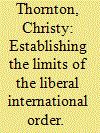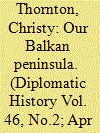|
|
|
Sort Order |
|
|
|
Items / Page
|
|
|
|
|
|
|
| Srl | Item |
| 1 |
ID:
188673


|
|
|
|
|
| Summary/Abstract |
Using a historical analysis based on archival research in Mexico, the United States, and Great Britain, this article argues that as Latin American negotiators waged campaigns for reforms to rules for trade, investment, and development lending in the twentieth century, they came to inadvertently illustrate what was acceptable and what was impossible within the terms of the Liberal International Order (LIO). In each of the three episodes examined, US government officials actually acquiesced to the demands of experts and political figures from the developing world, agreeing to broad international frameworks that were intended to scale-up the welfarist vision of ‘embeddedness’ to the international arena. But in each of these cases, those government officials subsequently saw their concessions vetoed by the action of powerful capitalist interests fearful of what the limits to power might mean for their bottom lines. It was in this struggle unfolding over time—as representatives from Latin America and elsewhere in the industrialising world tried to build an infrastructure of development that would meaningfully embed US capital in a framework of rights and obligations, and as capital organised to respond, rallying business associations and allied government representatives—that the limits of the LIO came to be defined.
|
|
|
|
|
|
|
|
|
|
|
|
|
|
|
|
| 2 |
ID:
188669


|
|
|
|
|
| Summary/Abstract |
The contributions to this special issue take a Global South perspective rooted in the long experiences of Latin American countries with international organisation, laws and norms. Contributors explore how the weaker, poorer, and presumed subordinate Latin American states have contributed to and challenged the construction and development of today’s Liberal International Order (LIO). The articles in this special issue ask what Latin American experiences in different domains and historical periods can tell us about the LIO as it now fractures and reconstitutes. The core argument among these essays is that, despite inherent contradictions and tensions, Latin American engagements with the LIO have attempted to level the playing field and prevent the reinforcement of existing international hierarchies. The contributions to this special issue demonstrate that Latin American actors were not mere norm-takers and passive supporters of the LIO. Latin American actors have often sought to hold the leaders of the LIO to their own promises. They have insisted that the rules of a rules-based order should apply not just to the poor, weak or indebted but to the rich, strong and powerful as well.
|
|
|
|
|
|
|
|
|
|
|
|
|
|
|
|
| 3 |
ID:
185597


|
|
|
|
|
| Summary/Abstract |
The debate over whether the United States should join the League of Nations, an intense and sometimes acrimonious battle that pitched Republican against Democrat, president against congress, and reservationist against irreconcilable, was fought on a complicated terrain. The world order as it had existed had been shattered, and a new battle emerged between world leaders over what might replace it. The question of how to deal with vanquished enemies was crucial, of course, as was the dispensation of colonial territory; the map of Europe and its imperial possessions would be redrawn. The role that the United States should play—militarily, financially, and politically—was a key question, and U.S. President Woodrow Wilson provided an answer with the promulgation of the Fourteen Points and the proposal for a League of Nations.1 For a surprising number of participants in the League debate, however, the question of world order turned not just on British Naval supremacy, German war reparations, or the borders of French territory, but on a problem half a world away from Europe: the Mexican revolution. Theodore Roosevelt probably put the connection in its starkest terms, in a phrase he used repeatedly in the columns he wrote about the proposed League in the weeks before his sudden death. “Mexico is our Balkan Peninsula,” he wrote in a denunciation of the League on Christmas Eve 1918, adding ominously: “Some day we will have to deal with it.”2
|
|
|
|
|
|
|
|
|
|
|
|
|
|
|
|
|
|
|
|
|